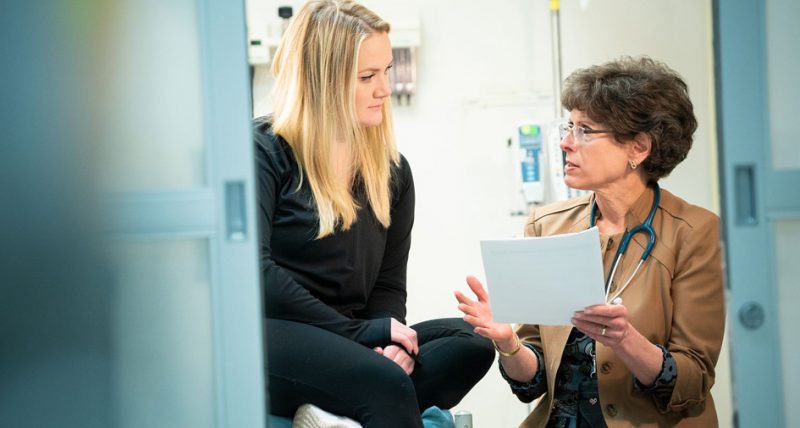
ABMS Portfolio Program Sponsor Spotlight: St. Jude Children’s Research Hospital
St. Jude Children’s Research Hospital’s After Completion of Therapy (ACT) Clinic is the world’s largest long-term follow-up clinic for pediatric cancer survivors, and was established in 1984 to specifically address the needs of the growing population of long-term survivors. Childhood cancer survivors being followed in this clinic undergo comprehensive annual health evaluations until they are at least 10 years from cancer diagnosis and have attained the age of 18 years.

St. Jude Children’s Research Hospital (SJCRH), Memphis, Tennessee, opened its doors to patients in 1962 and all survivors at least five years from diagnosis who have been off cancer therapy at least two years are eligible for transfer to ACT clinic. The patients seen in this clinic therefore range in age from five-year old children to adults in their sixth and seventh decades of life. SJCRH’s ACT Clinic is also the center for the St. Jude Lifetime Cohort Study, that was established in 2007 to prospectively evaluate adverse health outcomes of adults treated for childhood cancer, throughout their lifetime. The findings from SJLIFE study are helping cancer survivors learn more about their individual health needs and providing researchers with novel insights into the late effects of cancer therapy.
The goal of the ACT clinic is to help improve the quality of life of pediatric cancer survivors. This is achieved by facilitating access of cancer survivors to resources that optimize physical and emotional health, social functioning, educational and vocational achievement, and transition to community care. All regular ACT patients undergo detailed annual health evaluations based on health risks associated with specific cancer treatment exposures. Additionally, all cancer survivors receive counseling about lifestyle changes for risk mitigation, regular health screenings and surveillance, and assistance with addressing psychosocial challenges associated with survivorship.
Over time, the St. Jude survivorship care team noticed a disturbing trend: despite records indicating they were previously vaccinated, a significantly higher than normal percentage—over 50 percent, as opposed to 5 to15 percent in the general population—of its long-term cancer survivors failed to mount an immune response to their three-dose course of hepatitis B virus vaccine. According to the Centers for Disease Control (CDC) schedule, these patients would have received this vaccine series as newborns. It appeared the vaccine was no longer protecting these patients.

“Our whole program is focused on keeping cancer survivors well and assuring proper preventive immunizations is an important aspect. We are targeting hepatitis B and HPV vaccines as key components of all immunizations since these are two vaccines that have a preventive role against specific cancers that may happen later in life,” said Alia Zaidi, MD, director of epidemiologic studies and survivorship research at St. Jude Children’s Research Hospital. Cancer survivors are particularly at risk from hepatitis B virus (HBV) infection because of the potential for impaired ability to mount natural immunity when exposed to infection. People can be HBV carriers without being aware of it and as such they are the major source of spreading the disease in the community, as well as being at risk from chronic liver disease and possible liver cancer. To establish the baseline for prevalence of susceptibility to hepatitis B infection in cancer survivors attending the ACT clinic, a retrospective review of results of HBV serology was conducted in August 2018 that revealed 52.2 percent of the 2,147 patients who had the full serology panel on record were seronegative.
“Since most ACT patients are within the age group expected to have completed HBV vaccination course as newborns, these sub-optimal levels of anti-HBV antibody in our patient cohort suggested loss of vaccine-related immunity secondary to cancer therapy. Data from a recent Children’s Oncology Group study has also shown that childhood cancer survivors may have impaired recovery of immune responses even when treatment does not involve hematopoietic cell transplantation.”
Working together, the ACT team created “Establishing protection against HBV infection among long-term survivors of childhood and adolescent cancers,” a QI project that was submitted to the ABMS Portfolio Program. Continuing certification credit for participating physicians was granted by the American Board of Pediatrics, the American Board of Internal Medicine, and the American Board of Preventive Medicine.
Started in 2019, this multiphase project aimed to provide HBV screening by testing for immunity to HBV at least once after completion of all active cancer therapy in 100 percent of the childhood cancer survivors coming for their ACT clinic appointments and by providing counseling and guidance about re-immunization to all who are found susceptible.
In Phase One of the project, the team created awareness among ACT clinic staff, physicians, and advance practice providers about the HBV issue affecting their long-term cancer survivors. It was believed that the project would be more effective if all professionals who interacted with patients and their families used similar language and provided the same information and guidance. Simplified educational material and a short recommendation statement about revaccination were created as a handout/mail-out for patients and families.
The entire team focused on working directly with patients, ages birth to 25 years, who came into the ACT clinic for their annual health evaluation. This age band was chosen because the HBV vaccine was added to the United States’ universal immunization schedule in the early 1990s, which meant that most people in the project group should have received HBV vaccine. This effort also included validation of patients’ immunization history by obtaining a copy of the formal immunization record for all ACT patients.
The outcome measures for this phase of the project were that all patients should have a validated immunization record on file and baseline HBV serology result. All patients with non-immune serology results should receive educational handouts and have documented evidence of counseling provided in clinic about need for reimmunization. A total of 1,533 cancer survivors have visited the ACT clinic since the start of project, and by April 2021, all of these have immunization records on file and HBV testing. A total of 991(65 percent) had absent or low levels of anti-HBV antibodies, suggesting susceptibility to HBV infection. All these patients and their families have received counseling about HBV serology results and recommendation for re-immunization.
Phase Two of the QI project focused on assessing patient compliance with the recommendation for re-immunization. “This is the more challenging part of the project, given vaccine hesitancy in general, as well as the lack of preparedness of primary care providers to administer “childhood” vaccinations outside the normal schedule. Also, patients in ACT clinic are seen only once a year, so it takes another year to find out if our interventions really made a difference,” says Dr. Zaidi. This phase was begun in 2020 when it was noted that 57 percent of the 257 patients who had returned to ACT clinic for their second visit after receiving counseling for re-vaccination remained non-compliant with the recommendation. A new intervention was added at this point in the form of a letter to the patient’s primary care provider, advising them about the patient’s potential susceptibility to HBV and encouraging them to offer a second course of HBV vaccination per CDC guidance for seronegative individuals.
As of April 2021, 139 of 147 (95 percent) had letters sent to their primary care providers, with the hope that this intervention will facilitate compliance. However, this work was made doubly difficult by the unanticipated complication of cancellation of all ACT clinic scheduled visits from March through till August 2020 due to the COVID-19 pandemic. The clinic has reopened but numbers allowed to return remain very limited, though this is expected to improve as the pandemic subsides. This work remains ongoing, and the resolve is to continue to educate and guide all cancer survivors about the risks of HBV infection.
“Recognizing its significant value to patients and clinical teams, St. Jude has been placing a great deal of emphasis on QI work, which is wonderful,” said Dr. Zaidi. “After taking an excellent QI course through the Cincinnati Children’s Hospital’s James M. Anderson Center for Health Systems Excellence, I fell in love with the process and enjoy the good feeling I get from helping to make change that could improve patient care and outcomes.”

However, not even a comprehensive QI course could have prepared the team for the complications they faced in implementing this project. “When we developed this QI project, it seemed fairly straightforward: make sure that our cancer survivors are protected against HBV,” said Elisabeth Adderson, MD, Director of the Pediatric Infectious Diseases Fellowship Program for St. Jude Children’s Research Hospital. “What struck me throughout this whole process was how complicated health care really is, from the basic science of vaccines to how we deliver care to the obstacles that need to be dealt with, including a global pandemic. It’s complicated, but if we approach things step-by-step and with a collaborative spirit, great things can be accomplished.”
Dr. Zaidi agrees and offers this helpful tip to clinicians, “Quality improvement work can be challenging especially when conducted in a highly research-oriented setting where everyone is used to robust planning preceding the initiation of a study. If you are new to this, like me, be prepared for a learning curve not just for yourself but also for your whole team. It takes patience and perseverance to get people to understand and appreciate the value of QI philosophy and to recognize the uniqueness of this iterative learning process that requires you to test on small scale and spend more time on observation and evaluation of the effect of your action, than on creating a perfect plan upfront.”
Due to the pandemic, the St. Jude Survivorship Program has extended its QI project into 2021 and will publish its results to share with other institutions.
Note: The feature photo was taken at St. Jude Children’s Research Hospital prior to the COVID-19 pandemic.
Read more Portfolio Program Sponsor Spotlights
